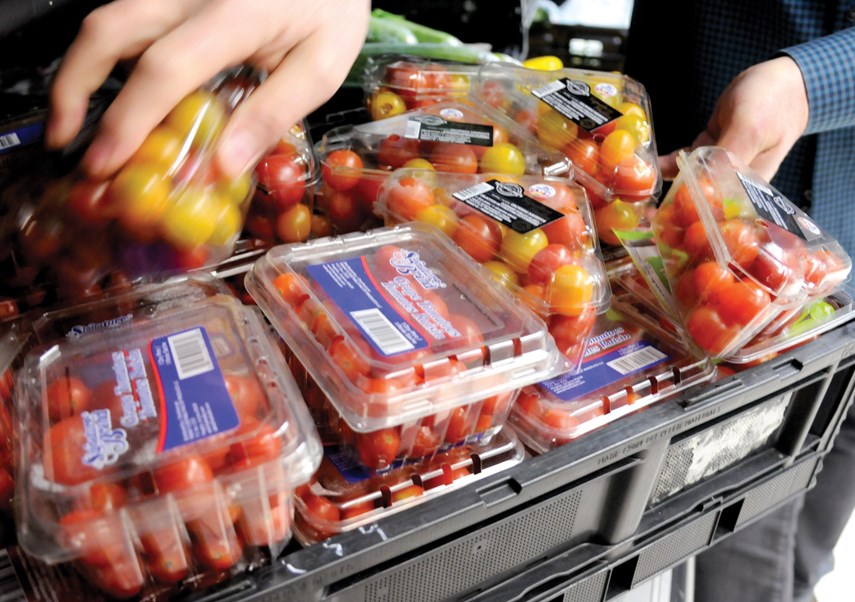Many people on the North Shore, including many seniors and older adults, are struggling to adjust to what’s become the often stressful act of grocery shopping amid the ongoing COVID-19 pandemic.
West Vancouver resident Patricia Tripp didn’t use to worry about getting what she needed from her local supermarket, but that’s all changed, at least for the time being, as social distancing rules coupled with the need to get food have turned grocery shopping into more of an ordeal than it once was.
“As a senior, it’s just a challenge. The last couple of weeks it’s hard to get basic things,” said Tripp. “I appreciate that the stores have a devil of a problem, and it’s unfortunate that they didn’t start limiting people from the get-go. That business with the toilet paper is pathetic.”
It’s no secret that demand for grocery store products has spiked in recent weeks as people, despite advice from experts, have looked to stock up, though many food retailers and grocers on the North Shore have endeavoured to adjust their operations to meet demand.
The North Shore News has compiled a list of some grocers and what they’re doing during the ongoing novel coronavirus pandemic:
Save-On-Foods
Save-On, which operates four stores in North Vancouver, has reduced its operating hours to between 8 a.m. and 8 p.m. everyday. The decision was made in order to give employees more time to rest, and increase the amount time they’re able to restock shelves.
It’s also implemented an early-morning shopping hour dedicated to seniors, people living with disabilities and vulnerable populations from 7 a.m. to 8 a.m. everyday.
Real Canadian Superstore
Likewise, Real Canadian Superstore in North Vancouver has changed its operating hours to between 8 a.m. and 8 p.m. everyday.
The store has also included its own dedicated shopping hour between 7 a.m. and 8 a.m. everyday for those who need it.
Sobeys Inc.
Georgia Main Food Group operates IGA grocery stores in North Vancouver and West Vancouver, while Sobeys runs Thrifty Foods in North Vancouver and West Vancouver, and four Safeway grocers, including three in North Vancouver and one in West Vancouver. Both companies have similarly implemented reduced store hours from 8 a.m. to 8 p.m. everyday in order to allow for more sanitization efforts and restocking of shelves, according to a memo from Sobeys.
A seniors shopping hour has also been introduced for the first hour of the day.
Fresh St. Market
West Vancouver’s Fresh St. Market has gone to 8 a.m. to 8 p.m. hours everyday. The store is hosting its early-morning shop for seniors and high-risk individuals from 7 a.m. to 8 a.m. on Wednesday and Fridays. “We will provide a clean and low-stress environment to ensure we take care of our community in the best way possible,” a memo on the company’s website states.
Larry’s Market
Larry’s Market is a locally owned grocer in Lower Lonsdale which is currently operating from 7 a.m. to 10 .m. everyday. The grocer is also touting one-hour grocery delivery service from noon to 9 p.m. everyday.
***
On Sunday, the B.C. government provided clarification on guidelines for how the retail and grocery sectors should be operating during the COVID-19 crisis following concerns whether the provincial health authority’s directive banning the gathering of 50-plus people applied to them.
According to the provincial government, the under 50-person rule with regards to that particular sector – which is classified as an essential service – doesn’t directly apply to the retail food and grocery industry.
“The spirit of the order should be followed,” stated a government release, dated March 29. “This means that, for example, in large grocery stores where it is feasible to have more than 50 people present at one time, it is permissible to do so provided that appropriate physical distancing can be maintained.”
Other key considerations for grocery stores, according to the provincial government, include: placing hand sanitizer near doors, pay stations and other high-touch locations, ensuring markers are in place every two metres to create visible queues that support social distancing, not selling bulk items (except if they are dispensed using gravity feed bins), and more.
One of the biggest challenges faced by grocers and customers has been the avalanche of delivery requests, leaving some customers in a bind.
Tripp, who says she can’t normally make it to special seniors-only grocery store hours in-person, was stymied last week when she went to place an order online with her local grocer.
“It’s not possible. You can’t even pick a day for delivery,” she said.
Thrifty Foods says it has been experiencing “a higher volume of transactions” which may result in some performance issues if one’s trying to order online. For best results, the company recommends placing an online order between 8 p.m. and 4 a.m., and states: “There may be delays to the delivery or pickup time selected.”
Real Canadian Superstores heeds a similar warning to its customers looking to make online grocery purchases. Save-On-Foods states on its website that delivery time slots are extremely limited, and recommends that, if customers can, they’re encouraged to shop in-store.
While grocery stores across the North Shore are continuing their delivery services among the challenges of high-demand, there are some other options available, especially for seniors in need.
While West Vancouver facilities have mainly been closed, the Seniors’ Activity Centre is still offering its food service program on a take-out basis seven days a week, from 10 a.m. to 2 p.m. Click here for more information or call 604-925-7280.
And Meals On Wheels is still dishing out its ready-made food items to seniors on the North Shore who need it.
The West Vancouver Foundation has also started an emergency response fund with the aim of raising a half-million dollars to go to local non-profits, many of which contribute to food security.



